Toyota is set to make waves in the electric vehicle (EV) market with the much-anticipated launch of the Toyota Hilux Electric in 2025. This marks a significant milestone for the automaker, known for its conservative approach towards electrification compared to its competitors. The electric Hilux will initially be available exclusively in Thailand, with potential expansion to other markets being considered at a later stage. This strategic move underscores Toyota’s evolving commitment to sustainable mobility, despite its historical focus on hybrid technology.
Toyota’s Strategic Shift Towards Electric Vehicles
While many car manufacturers are aggressively pushing towards a zero-emission future, Toyota has traditionally taken a more cautious approach. The company has emphasized hybrids, believing that fully electric vehicles will not dominate the market, expecting their share to remain below 30%. However, the upcoming launch of the Toyota Hilux Electric Revo BEV signifies Toyota’s gradual yet deliberate shift towards embracing full electrification.
Why Thailand? The Ideal Launchpad for Electric Hilux
Thailand’s automotive market provides an ideal backdrop for the debut of the Toyota Hilux Electric. With over half of all cars sold in the country being pickup trucks, the demand for such vehicles is robust. This strong market preference creates a fertile ground for Toyota to introduce its electric pickup, potentially outpacing competitors like the forthcoming electric Isuzu D-Max, which will also be assembled in Thailand.
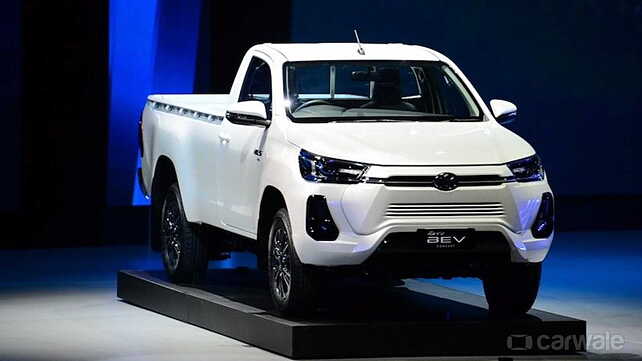
Electric Hilux: Specifications and Performance
Range and Battery Considerations
Toyota Hilux Electric will have a range of approximately 200 km. While this may seem modest, it aligns with the common challenges faced by electric pickups. Achieving a higher range would necessitate a larger battery, which could adversely affect the vehicle’s load-carrying capacity and maneuverability. The balance between range and functionality is a critical factor in the design and deployment of electric pickups.
Platform and Design Integration
The new-generation internal combustion engine (ICE) Hilux is also set to debut in 2025. It is anticipated that the Toyota Hilux Electric will share the same platform, benefiting from the advancements and features of the new-gen model. This integration could enhance the electric Hilux’s capabilities, making it a more attractive option for consumers seeking advanced electric vehicle features. While official confirmation from Toyota is pending, the synergy between the ICE and electric versions of the Hilux is a logical progression.
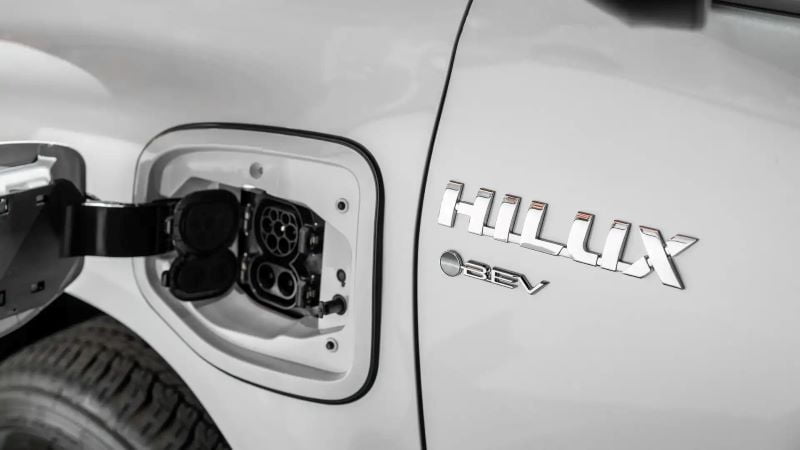
Potential for Fortuner Electric
The launch of the electric Hilux could pave the way for other electrified models, such as the Fortuner Electric. Given the shared platform, the Fortuner, a popular SUV, could see its electric variant in the near future. This strategic move would allow Toyota to capitalize on the existing popularity and market presence of the Fortuner while expanding its electric vehicle lineup.
Future Prospects and Upcoming Models
Toyota’s venture into the electric pickup market is not limited to the Hilux. The company has showcased several concepts and models that hint at a broader electric future:
The Tacoma and EPU Concept
In 2021, Toyota revealed a pickup truck concept that resembled the Tacoma, a popular model in its lineup. This was followed by the unveiling of the EPU concept at the 2023 Japan Mobility Show. The EPU features a unibody construction and dimensions similar to the Fiat Toro, highlighting Toyota’s innovative approach to electric vehicle design.
IMV-0 Concept and Global Applications
Another notable concept is the IMV-0, a small modular electric pickup truck presented at the same event. The IMV-0 platform is already in use in several countries, albeit with combustion engines. The platform’s versatility could see it adapted for electric variants, expanding Toyota’s electric vehicle offerings across different markets.
The Hilux Champ: A Step Towards Electrification
The IMV-0 platform is currently utilized in models like the Hilux Champ, which is sold with combustion engines. Recently registered in Brazil, the Hilux Champ shares many components with the standard Hilux. This model could potentially be produced in Argentina, further extending Toyota’s reach in the electric vehicle market.
Challenges and Opportunities for Toyota’s Electric Hilux
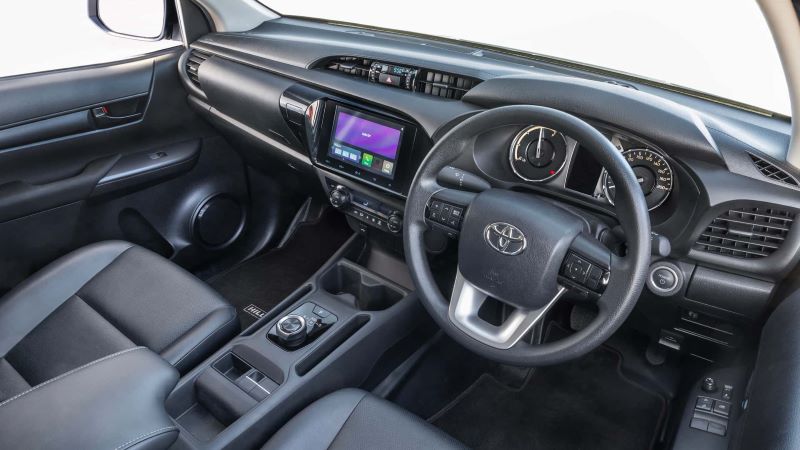
Addressing Range Anxiety
One of the primary challenges facing electric vehicles, particularly pickup trucks like the Hilux, is range anxiety. The initial 200 km range might be seen as insufficient by some potential buyers, especially those using their trucks for long-haul tasks. However, this limitation also presents an opportunity for Toyota to innovate. By focusing on efficient battery technology and possibly integrating hybrid options, Toyota can address these concerns. Additionally, developing a robust network of charging stations in key markets like Thailand will be crucial in mitigating range anxiety and enhancing the appeal of the Toyota Hilux Electric.
Balancing Performance and Practicality
Electric pickups face the unique challenge of balancing performance with practicality. Larger battery packs provide greater range but can reduce the vehicle’s payload capacity and impact handling. Toyota’s engineering prowess will be tested as it strives to maintain the Hilux’s renowned durability and versatility while optimizing its electric performance. Advances in battery technology, such as solid-state batteries, could offer solutions by providing higher energy density without significantly increasing weight.
Toyota’s Commitment to Sustainability
Hybrid Synergy and Electric Vision
Toyota’s commitment to sustainability extends beyond its electric vehicle initiatives. The company’s hybrid technology, exemplified by models like the Prius, has laid a strong foundation for its electric future. The lessons learned from decades of hybrid development will undoubtedly influence the design and performance of the Toyota Hilux Electric. By combining hybrid and electric technologies, Toyota can offer a diverse range of environmentally friendly vehicles, catering to varying consumer needs and preferences.
Global Environmental Goals
Toyota’s strategic move towards electrification aligns with global environmental goals. As countries around the world implement stricter emissions regulations and set ambitious targets for reducing carbon footprints, automakers are compelled to adapt. The Toyota Hilux Electric, with its lower emissions and potential for future innovations, positions Toyota to contribute significantly to these global efforts. Moreover, by expanding its electric vehicle lineup, Toyota can meet the growing demand for sustainable transportation options.
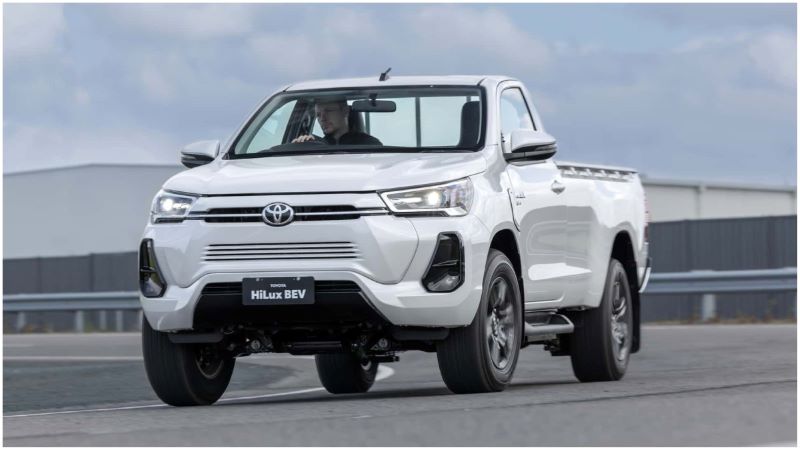
Market Expansion and Competitive Landscape
Global Market Potential
While the Toyota Hilux Electric will initially be available only in Thailand, its success could lead to expansion into other markets. Countries with a high demand for pickup trucks, such as Australia, South Africa, and various regions in South America, present significant opportunities for Toyota. By tailoring the electric Hilux to meet the specific needs of these markets, Toyota can enhance its competitive edge and capture a larger share of the global electric vehicle market.
Competition and Differentiation
The electric vehicle market is becoming increasingly competitive, with numerous automakers introducing electric pickups. Rivals like the electric Isuzu D-Max and potential entries from other major brands highlight the need for Toyota to differentiate its offering. Toyota’s reputation for reliability and its extensive experience in hybrid technology provide a solid foundation. By focusing on superior build quality, advanced features, and exceptional customer service, Toyota can set the electric Hilux apart from its competitors.
Innovations in Electric Vehicle Technology
Advanced Driver Assistance Systems (ADAS)
The integration of advanced driver assistance systems (ADAS) is a key area of innovation for electric vehicles. The new Toyota Hilux, both ICE and electric, is expected to feature state-of-the-art ADAS technologies. These systems, which include adaptive cruise control, lane-keeping assist, and automated emergency braking, enhance safety and driving convenience. For the Toyota Hilux Electric, ADAS could be further optimized to maximize battery efficiency and extend range.
Smart Connectivity and Infotainment
Modern consumers expect their vehicles to be equipped with the latest connectivity and infotainment options. The Toyota Hilux Electric is likely to feature an advanced infotainment system with seamless smartphone integration, real-time navigation, and remote vehicle management via mobile apps. These features not only enhance the driving experience but also appeal to tech-savvy buyers who prioritize connectivity.
Sustainable Materials and Manufacturing
In addition to technological advancements, Toyota is likely to focus on sustainability in the materials and manufacturing processes used for the Toyota Hilux Electric. Utilizing recycled and eco-friendly materials, reducing waste in production, and ensuring energy-efficient manufacturing practices will align with Toyota’s broader environmental goals. These efforts will not only reduce the vehicle’s carbon footprint but also resonate with environmentally conscious consumers.
The Road Ahead for Toyota’s Electric Vehicles
The launch of the Toyota Hilux Electric in 2025 is just the beginning of Toyota’s expanded foray into the electric vehicle market. As the company continues to innovate and adapt to changing market dynamics, we can expect a broader range of electric and hybrid models. The potential introduction of the Fortuner Electric and other electric variants underscores Toyota’s commitment to a sustainable automotive future.
With a strategic focus on balancing performance, practicality, and sustainability, Toyota is well-positioned to meet the evolving demands of consumers and contribute to global environmental goals. The electric Hilux, with its blend of advanced technology and proven reliability, is set to be a game-changer in the pickup truck segment. For more click here.
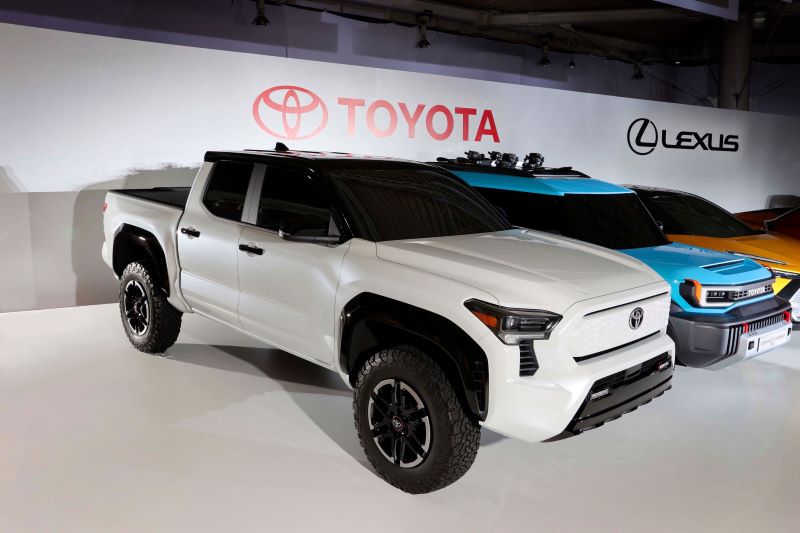
FAQs about the Toyota Hilux Electric Launch
1. When will the Toyota Hilux Electric be launched?
The Toyota Hilux Electric is confirmed to be launched in 2025. Initially, it will be available exclusively in Thailand, with potential expansion to other markets considered at a later date.
2. What is the expected range of the electric Hilux?
The electric Hilux is expected to have a range of approximately 200 km. This range might seem modest but aligns with the common challenges faced by electric pickups. A larger battery, which would provide a greater range, could impact the vehicle’s load-carrying capacity and maneuverability.
3. Why is Toyota launching the electric Hilux in Thailand first?
Thailand is an ideal launchpad for the electric Hilux due to its significant demand for pickup trucks. Over half of all vehicles sold in Thailand are pickups, presenting a substantial market opportunity for Toyota. Additionally, assembling the electric Hilux in Thailand allows Toyota to leverage the existing manufacturing infrastructure and meet local market needs.
4. Will the new-gen ICE Hilux and the electric Hilux share the same platform?
While there is no official confirmation from Toyota yet, it is likely that the electric Hilux will be based on the same platform as the new-generation internal combustion engine (ICE) Hilux, which is also set to debut in 2025. This shared platform could enhance the electric Hilux’s capabilities and support advanced features typically found in electric vehicles.
5. Is Toyota planning to introduce other electric models, such as the Fortuner Electric?
Yes, the launch of the electric Hilux could pave the way for other electrified models, such as the Fortuner Electric. Given the shared platform and the popularity of the Fortuner, it is logical for Toyota to consider expanding its electric vehicle lineup with an electric variant of this popular SUV in the future.
More From TalkBoutCars
- Pininfarina Morgan Midsummer Roadster Revealed – Limited To Just 50 Units
- Mahindra Announces Bookings For XUV 3XO: Prices Start At Rs 7.49 Lakh
- Hyundai Casper: Revolutionizing India’s Compact SUV Market
- Leapmotor’s Entry into the Indian EV Market
- Unveiling the MG Cloud EV: Transforming Indian Roads with Style and Sustainability
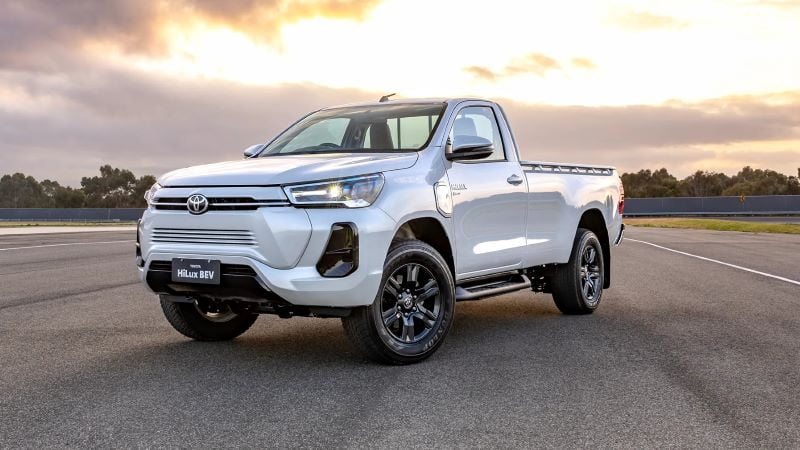
Leave a Reply